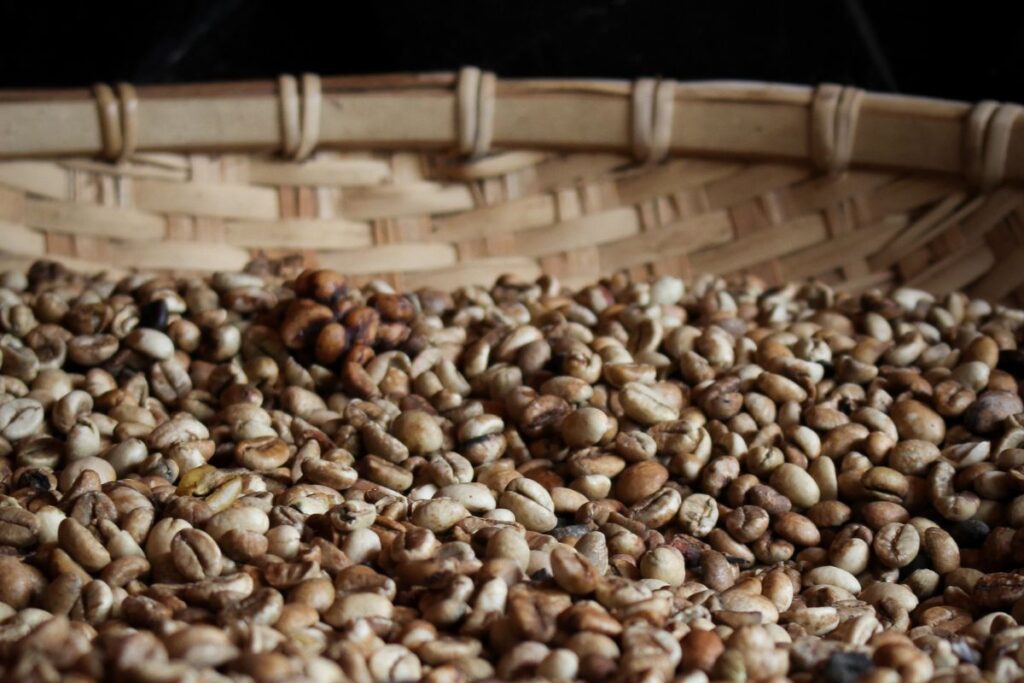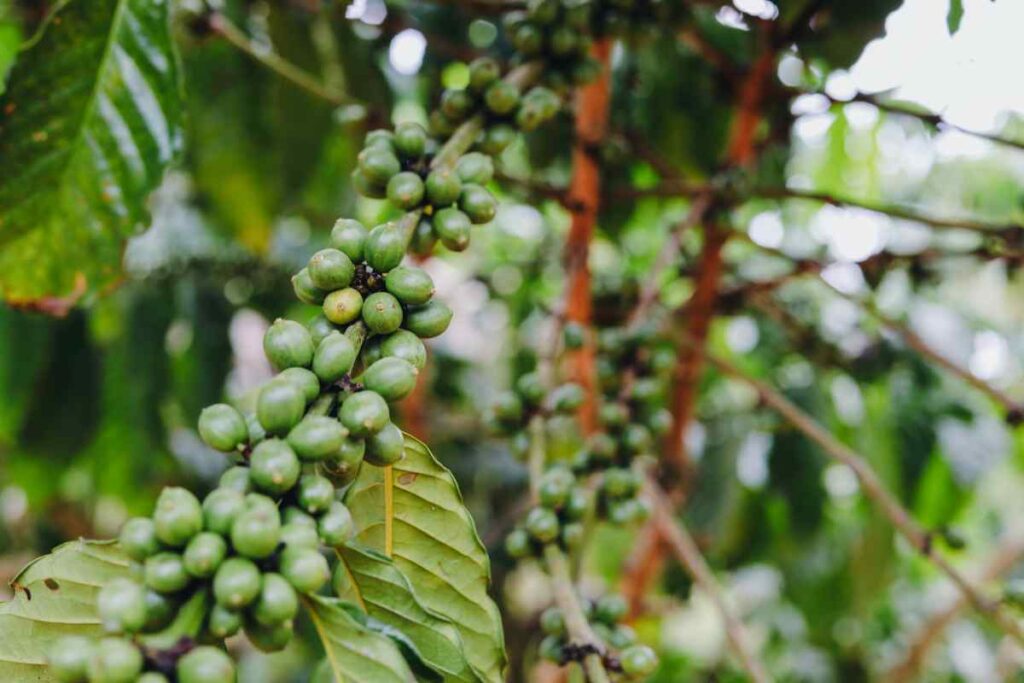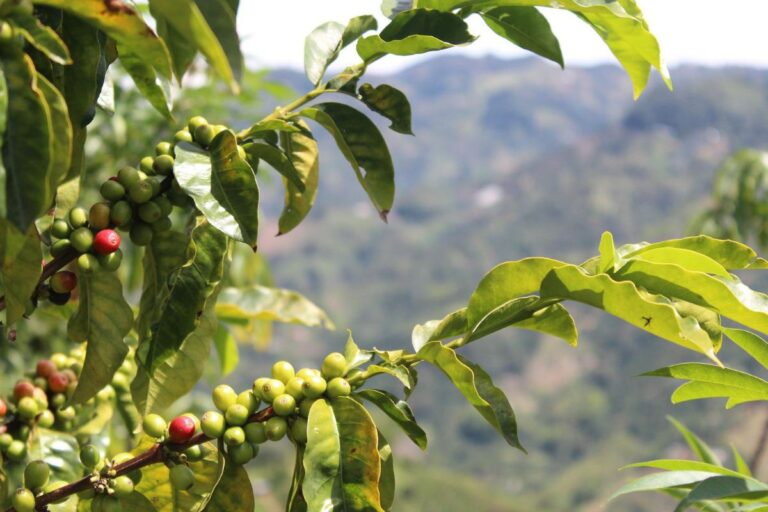Kenya is among the handful of coffee-producing countries in the world whose coffee is rated among the best.
How is this possible?
Let’s examine 6 authentic facts about coffee farming in Kenya.
By Lilian.
Published on 09.01.2022.
Affiliate disclosure
This page may contain affiliate links – we may earn a small commission when you make a purchase through these links. This is at no extra cost to you.
6 Facts About Coffee Farming in Kenya – Every Coffee Lover Should Know These!
Small Scale Farmers Produce 75% of Kenya’s coffee
You’d think that coffee in Kenya is grown on expansive acres of land.
Well, just about 25%.
According to the International Finance Corporation, 75% of Kenyan coffee is produced by small-scale farmers with only 0.3 to 0.5 hectares of land.
Arabica is the Main Variety of Coffee Grown in Kenya
According to the Kenya Agricultural and Livestock Research Organization (KALRO), the main coffee variety grown in Kenya is Arabica Coffee.
The other variety is Robusta.
Arabica coffee is more expensive because it’s much more delicate so the coffee plants need much more care during cultivation.
What’s more, they only grow at extremely high altitudes – sometimes over 6,000ft.
Robusta trees are hardier, more resistant to diseases, and they can grow even at low altitudes.
Coffee Farming in Kenya was Introduced by the British Colonizers
According to Kikwetu, a popular Kenyan coffee company, coffee farming in Kenya started in 1893.
The white missionaries imported Brazil’s Bourbon coffee.
At the time, almost all Kenyan land belonged to the White settlers, so the native people provided free or cheap labor.
Coffee in Kenya is Harvested Twice a Year
In a coffee origin trip to Kenya, Mihkel Jürimaa, a coffee enthusiast and member of Paulig Barista Institute found that there are two coffee harvesting seasons.
The main harvest takes place at the end of the year – November to December. The other harvest is done mid-year, May – June.
Harvesting is extremely labor intensive, with around 30-40 pickers per hectare.
33 out of 47 Counties in Kenya have Coffee Farms
According to the Coffee Directorate, a statutory body that manages coffee production and marketing in Kenya, 33 counties out of 47 have coffee farms.
In terms of provinces, there are coffee farms in 7 out of 8 provinces.
The only province with no coffee farms is the North-Eastern Province which is too dry – it’s basically a desert.
Most of the coffee farms are located in the highlands west of Rift Valley and the high plateaus around Mount Kenya and the Aberdare Ranges.
These areas have rich volcanic soils that are excellent for coffee farming.
Kiambu County Produces the Greatest Volume of Coffee
Lars Kamer, a research leader in the African market, terms Kiambu the leading county in terms of coffee production in Kenya.
What’s more, most of the coffee from Kiambu is concentrated in farm estates compared to co-operatives.
In all the other counties in the country, most of the coffee comes from cooperatives.
Now that we have the most important coffee facts, let us now shift gear to Batian and organic farming in Kenya.

Batian Coffee Farming in Kenya
In 2010, the Coffee Research Institute (CRI) introduced the newest coffee variety in Kenya called Batian.
This large-sized bean, tall-variety coffee is a high-yield, disease-resistant coffee that grows on lower altitudes – 1300 to 3,300 ft.
Batian is a type of Arabica coffee that’s resistant to coffee berry disease as well as leaf rust. This means that farmers will not have to spend money treating diseases.
According to the African Fine Coffees Association, Batian coffee beans also ripen earlier than other coffee varieties.
The combination of all these factors makes coffee farmers love Batian coffee.
Organic Coffee Farming in Kenya
Despite the many benefits that come with organic coffee, Kenyan coffee farmers have not been quick to adopt it.
And unfortunately, a Kenyan colleague told me that even those that do organic farming have no certification, so they really can’t enjoy the benefits of their efforts.
Why is this?
Solidaridad Network, an international civil society organization that fosters sustainability in food supply chains around the world, found that Kenya’s coffee farmers, although doing organic farming, do not have certification because of the high cost of organic certification.
Certification costs $1,600-3,000, an amount that’s too high for small-scale farmers in Kenya.
In case you don’t know, most of them cannot even afford a decent life in terms of healthy food, good education, and decent housing.
This leads us to the next section – the challenges coffee farmers in Kenya encounter. Read on!
Agonizing Problems Facing Coffee Farming in Kenya
There’s no beating around the bush here.
Shortage of Capital Comes First
According to Nation Africa, Kenyan coffee farmers wallow in poverty.
Isn’t this a paradox considering that Kenya’s coffee is among the best coffees in the world?
They can barely afford capital to improve their farms and farm infrastructure.
But what’s the cause of all this?
The Mismanagement of Co-operative Societies
As stated earlier, coffee farms are concentrated in co-operatives – except Kiambu.
Coffee cooperatives around the country are marred by poor leadership and corruption problems, all of which disadvantage farmers.
It’s not unusual to find some cooperatives closing down after massive corruption deals among the leaders.

What About Shortage of Labor?
This is especially the case during the harvesting season.
In fact, there has been a generational gap in coffee farming in Kenya, a trend that can be attributed to decreasing coffee earnings.
An article by VOA News mentions that Kenyan coffee production has dropped by two-thirds since the 1980s, thanks to the younger generation showing no interest in coffee farming, and farming in general.
With more and more coffee farmers opting for alternative income generating activities, shortage of labor in the coffee farms is unavoidable.
Even more shocking, according to Kencaffee, the average age of coffee farmers in Kenya is 60 years! The future is bleak…
Last but not least:
Coffee Diseases are Disastrous
There are two most common coffee diseases in Kenya – coffee berry disease and leaf rust.
When a single coffee tree gets infected, the damage quickly spreads to the entire coffee farm.
Treating these diseases is not a one-day affair, neither is it cheap.
It can be a very devastating ordeal for farmers who already have little or no capital to invest in disease management.
Photos by Elizabetfm89, Elias Sorey and Heidi Ericson









